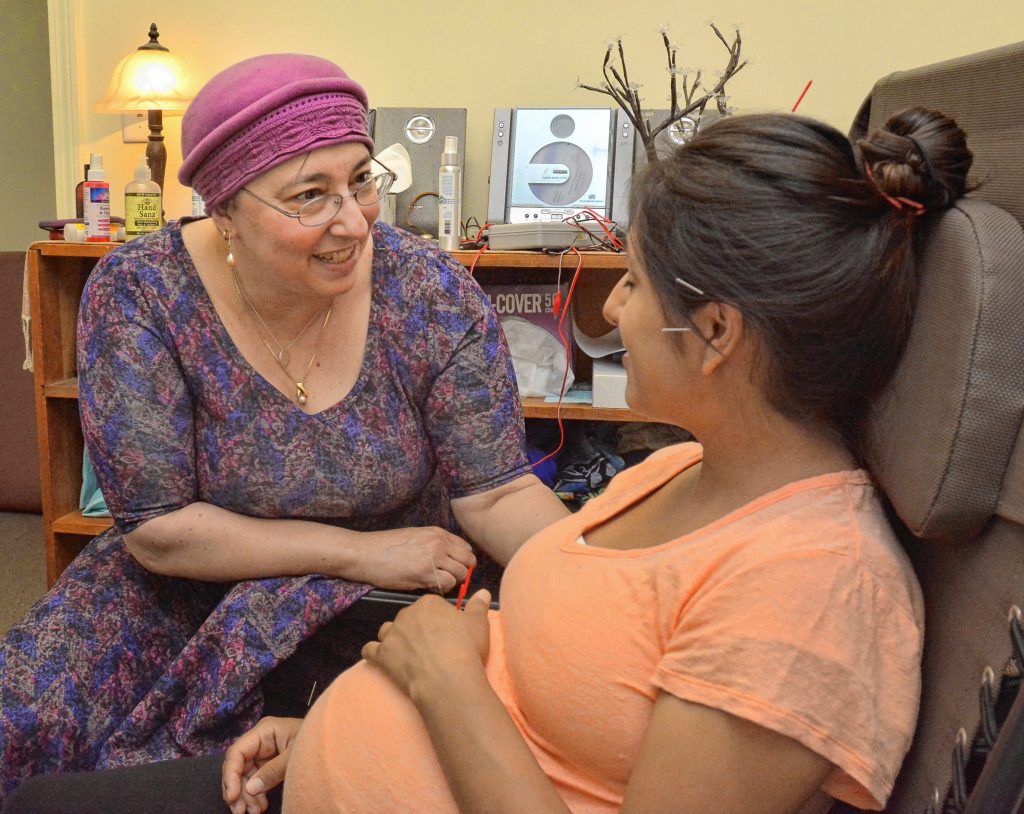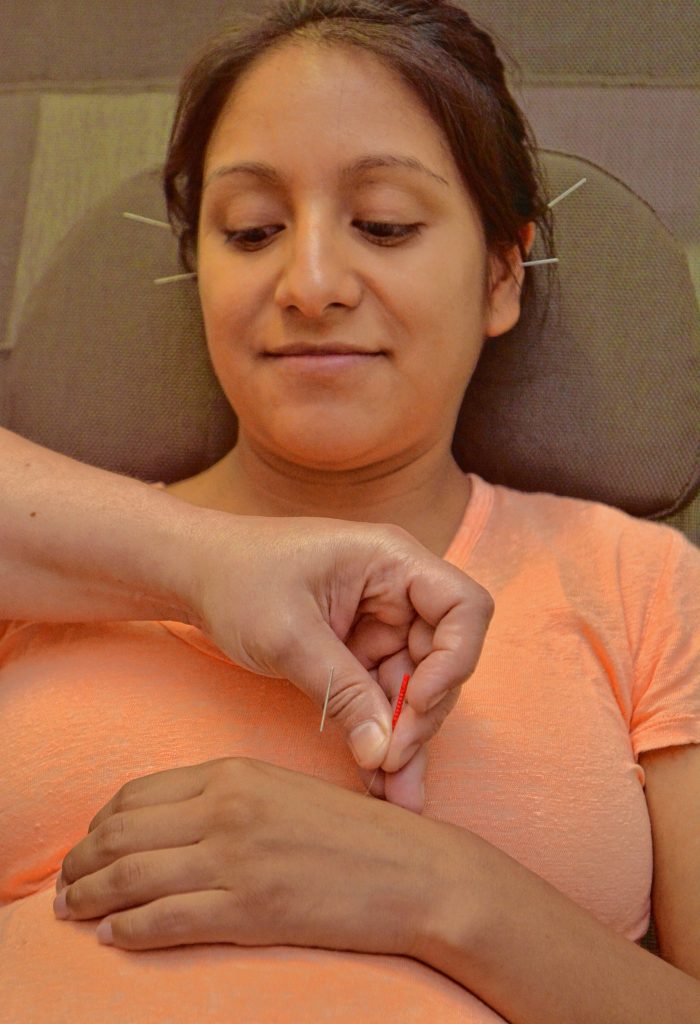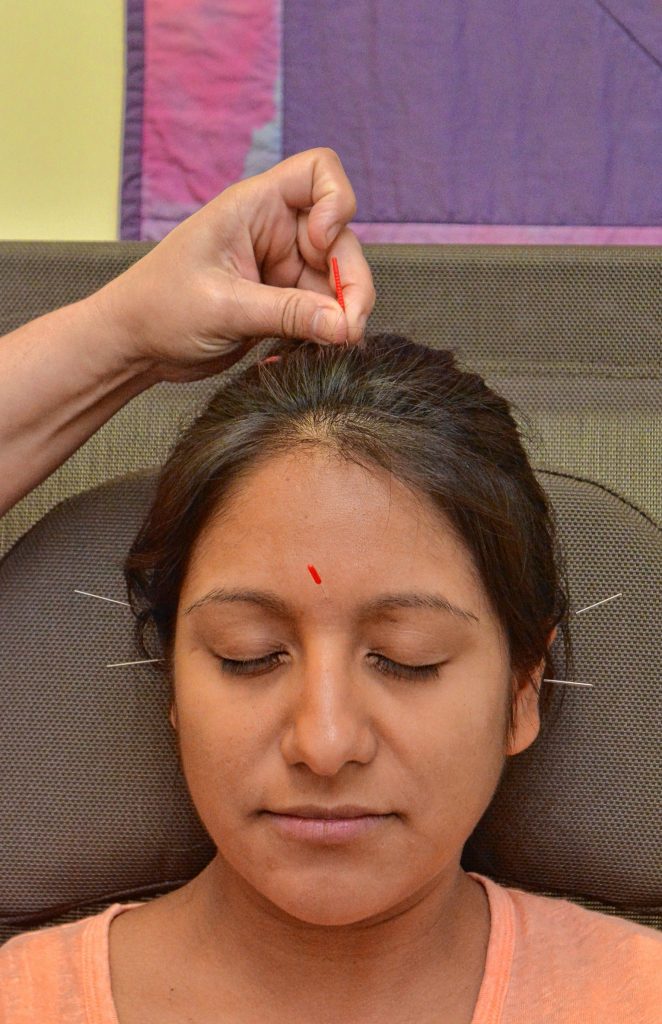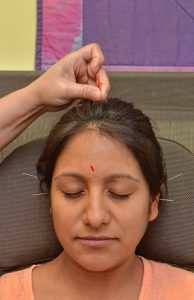Northampton resident Bob Flaherty, a radio personality on WHMP, was practicing for a golf tournament earlier this year when he missed the ball and hit the dirt. Pain shot through his arm; he thought he broke it.
“I couldn’t do anything,” he said. “I figure I’m not going to do tennis, golf, kayak. Riding a bike is the thing I do most, and I couldn’t even make the brakes work. My arm didn’t work.”
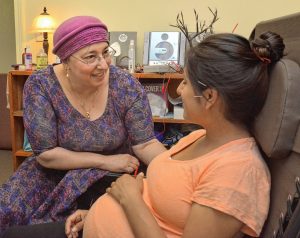
Amy Mager, left, who is an acupuncturist, talks with Saray Bentley, of Springfield, during a session at Mager’s office in Northampton, Wednesday. Jerrey Roberts photo
Flaherty wound up seeking acupuncture treatment with Northampton specialist Amy Mager. After five treatments, he said he feels back up to 99 percent with is arm. Over the summer, he participated in a joint legislative hearing on the benefits of acupuncture before the House and the Senate, which are considering bills that, among other things, would mandate insurance companies cover acupuncture.
“I think there’s a stigma to it,” Flaherty said on why acupuncture is not covered already. “People of a certain generation don’t trust it. It is not traditional medicine. It is not what they’re used to. But those attitudes are changing rapidly.”
Acupuncture is a form of Eastern medicine in which needles, heat, or pressure is applied to special places on the body known as acupuncture points, according to the National Center of Biotechnology Information. This is done to cause physical changes in the body and is based on the theory that vital energy called qi flows through the body along certain paths.
Mager, who came to acupuncture because of her own experience with unexplained muscle pain while she was performing manual labor in the 1980s, practices at Wellness House Northampton. She has performed acupuncture for 27 years, 25 of which have been in Northampton.
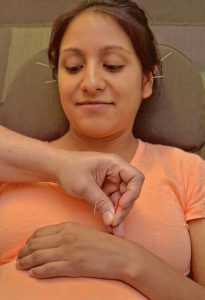
Amy Mager inserts an acupuncture needle into Saray Bentley, of Springfield, at Mager’s office in Northampton, Wednesday. Jerrey Roberts photo
Citing study after study, Mager touts the evidence-based science showing that acupuncture does lead to results in a number of different conditions, including chronic pain, aiding with pregnancy and birth, nausea, post-traumatic stress disorder, and addiction.
For Flaherty, the addiction piece is personal. He has a son who has struggled with addiction for 10 years, but has turned a corner. Had Flaherty known about the benefits of acupuncture on those with addiction, it is definitely something he would have recommended for his son, he said.
Much of Mager’s work centers around helping women get pregnant and keep their babies to term.
“[Acupuncture] is one of the tools that has been shown by Dr. Lee Hullender Rubin to support women to have more live births and help with in vitro fertilization,” Mager said.
Mager is supporting several bills going through the state Legislature at present. One — Senate Bill 1198 — would create a panel to look at how acupuncture can be used as part of an integrated health care system. Another — House Bill 566 — would mandate acupuncture coverage in Massachusetts from insurance companies.
She anticipates resistance, especially from insurance and pharmaceutical companies.
“Big pharma is big business, and I’m not anti-medication, but I’m anti the overuse of any medication,” Mager said. “Opioids used to be the answer to everything. Now new laws are demanding less opioids.”
Sen. Eric Lesser, of Longmeadow, is a cosponsor of the Senate bill and said he supports the House bill, as well. In part, it is because acupuncture offers an alternative to prescription medicine for many patients, he said.
“If we reorient and start with acupuncture first, it is going to mean there is less reliance on these prescription drugs and less of these drugs floating around,” he said. “That is a really important element in combating the opioid crisis.”
In addition, Lesser said acupuncture offers a relatively inexpensive treatment option for insurers, who in the long term could save money by not having to cover costly surgeries. It is also a treatment that promotes overall wellness, he said.
Lesser also supports the legislation as a way to treat veterans with post traumatic stress disorder and other chronic injuries, he said.
“It is not going to replace traditional medicine, but it gives options and ways to tackle illness and pain,” he said.
Lesser likewise anticipates pushback from insurance companies.
“We’ve got a lot of big insurance companies in the state and if it was up to them, they would cover nothing,” he said. “Every time we try to do this — I have a bill for insurance coverage of drug detox and expanding the length of time for people to get treatment — they fight that. They fight everything.”
In the absence of universal coverage of acupuncture by insurance companies, local acupuncturists are providing customers with lower-cost options, including group acupuncture, where a specialist will work on treating several patients at once.
Rachel Condon, who runs Northampton Community Acupuncture on Main Street, uses that model exclusively and has seen her business expand to the point that she has hired two additional acupuncturists.
Rather than charging between $75 to $150 for a private session, group sessions with Condon or one of the other acupuncturists at Northampton Community run patients between $20 and $40.
“It is very satisfying to treat a lot more people,” she said. It allows access and affordability and a much wider range of people to try it.”
Condon has mixed feelings about whether insurance companies should be mandated to cover acupuncture.
“I feel a lot of times acupuncture is still misunderstood by western medicine and by the American Medical Association,” she said. “I have some reservations about getting swallowed up into that whole system.”
She said she has seen a movement in the past decade of more people trying out acupuncture. Sometimes that is because people are frustrated with other options for managing their malady, and other times people hear about it through word of mouth.
Condon said she gets questions about whether needles are sterile and whether they are reused, and she reassures people that needles are sterile and are not reused. Many people wonder if it hurts.
“Most people are pleasantly surprised by how gentle it is,” she said.
Mager does her own version of group sessions, and has a Tuesday evening session for those who identify as women, including transgender women.
She said she provides this women-only space because she was date-raped and believes in providing safe spaces for women.
“Every woman has the right to feel safe and to be safe,” she said. “It is not that all men do these kinds of things but it is that when women experience trauma they need to feel safe enough to feel what they are feeling, whatever their physical issues.”
Julie Feinland, an acupuncturist and midwife, said she practices a different type of acupuncture called five elements acupuncture. The techniques vary somewhat, but it still involves using needles on specific points in the body.
At the same time, her practice as a midwife allows her to see benefits of both eastern and western medicine.
“They both have their genius about them, so I love to be able to employ different choices for different people that are right for them,” she said.
As far as insurance coverage, Feinland said it would be great if insurance covered acupuncture.
“In other consumer service areas, if customers want something, they get it; health insurance doesn’t work like that,” she said. “You can’t evaluate options as opposed to buying a car or shopping for groceries or something like that. It is more like my insurer covers this doctor and these services so that is what I have.”
Dave Eisenstadter can be reached at deisen@valleyadvocate.com.

